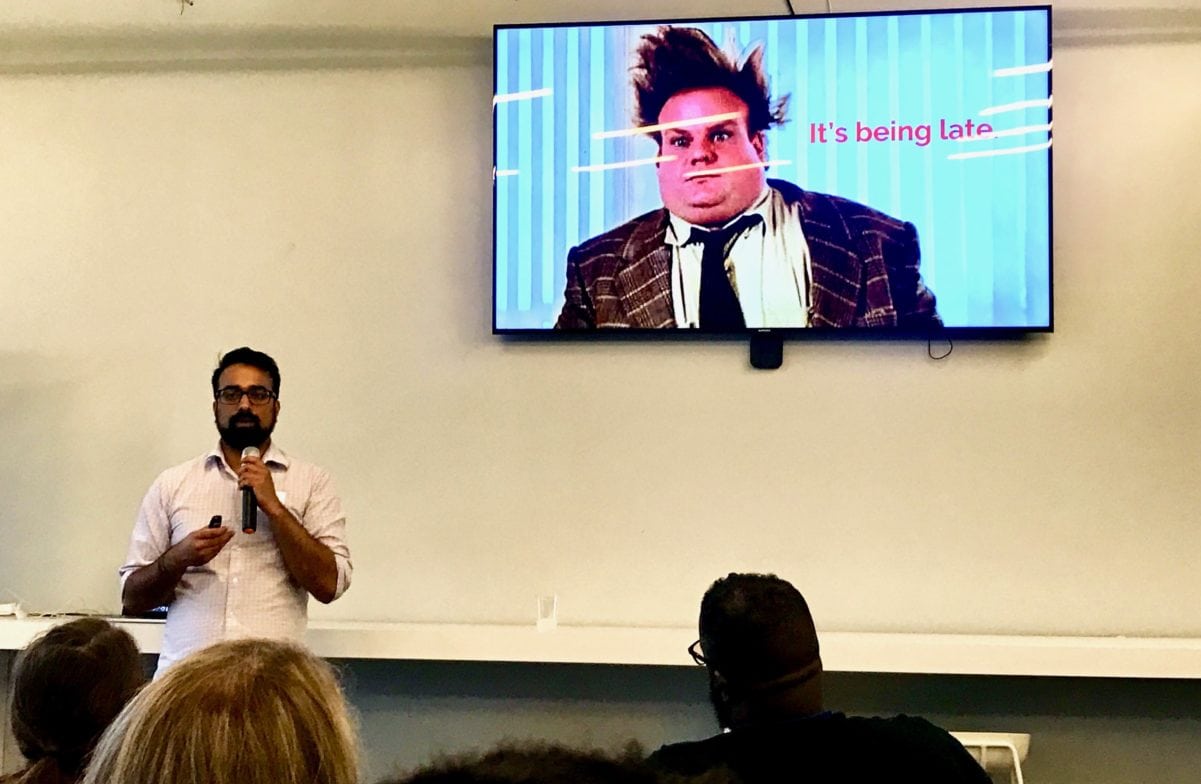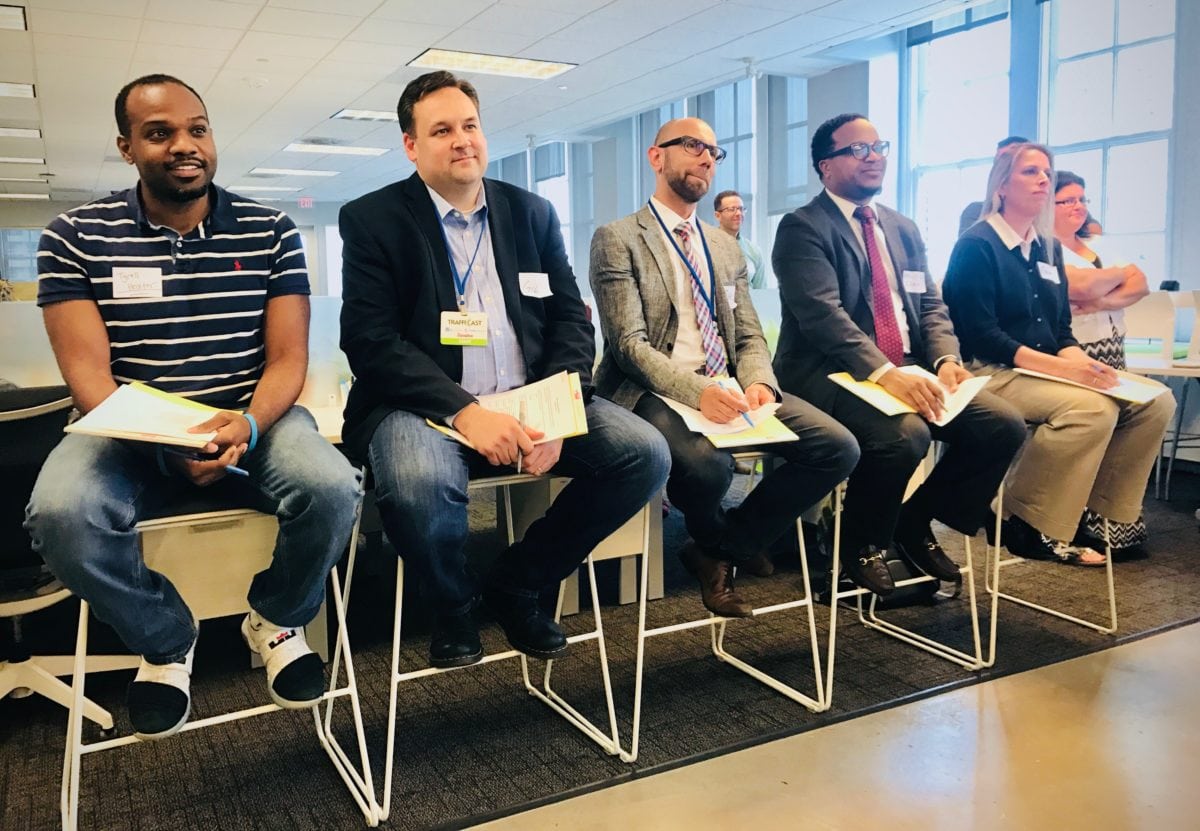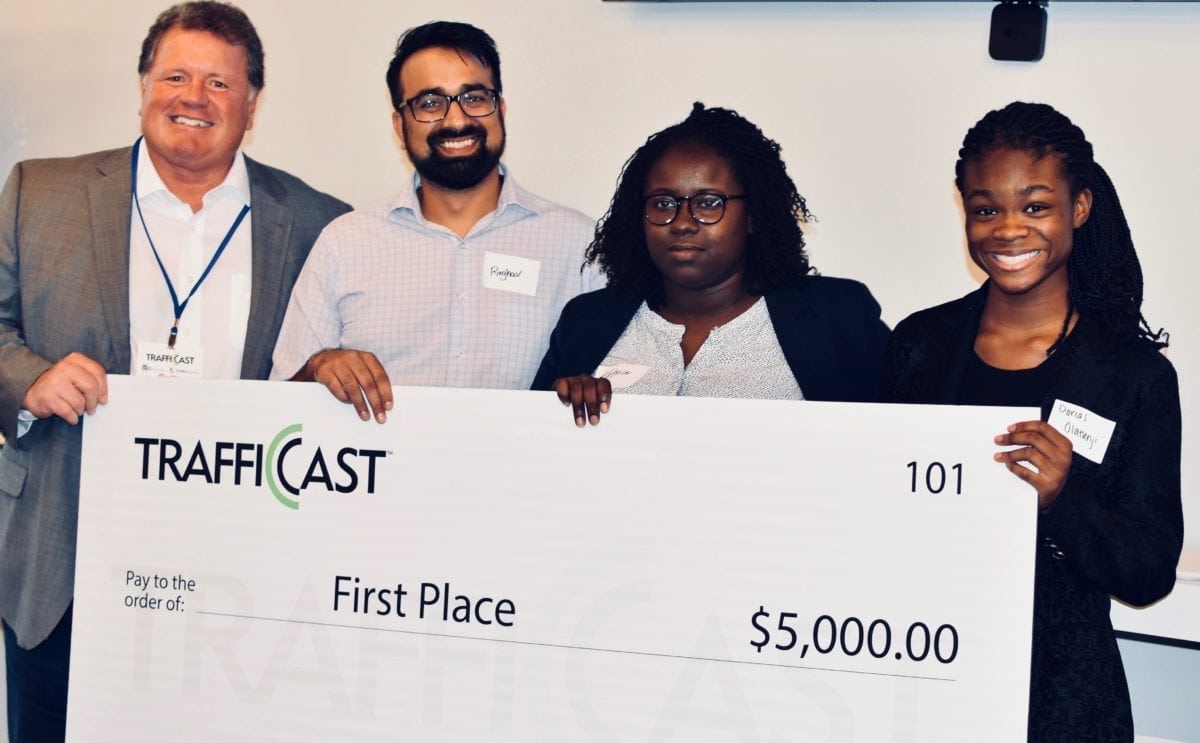Daydream with us a moment, won’t you?
You’re driving home from work in bumper-to-bumper traffic, foot flipping quickly between break and gas pedal. You’re tired and ready to be home, when suddenly, your speakers start playing the angelic sounds of birds chirping, letting you know you’re passing a local park.
Don’t panic, you haven’t accidentally invited a tiny, feathered guest into your car. It’s just one of the many imaginative audio features proposed at last month’s Future of the Commute: TrafficCast Design Challenge. The goal of the event: to improve the commuter driving experience, which can be about as fun and convenient as a root canal.
TrafficCast — a national leader in traffic data and technology that’s based in Wilmington, Del. — created the design challenge in search of “fresh designs and innovative ideas to power a better mobility solution” for daily travelers. Participants were asked to pitch creative ideas for new app features that would improve the daily commute, based on market information and traffic data provided by TrafficCast.
“The concept for this competition was meant to open our eyes to what we can do with all the data we have access to. And it did,” said TrafficCast CEO Al McGowan.
Though you may not be familiar with the TrafficCast name, you most definitely use its data on a daily basis. That travel forecast you listen to on the TV or radio as you get ready for work? Provided by TrafficCast. The maps with red, orange and green traffic flow lines that magically update on your car’s navigation dashboard? Yep, TrafficCast. The GPS data you rely on when you don’t know where you’re going? That’s right: TrafficCast.
Though it has maintained a low public profile over the years, new products, like its TrafficCarma mobile app, have allowed TrafficCast to step out from behind-the-scenes to engage with consumers about how it’s working to improve the commuter experience, and reduce the negative impact on the environment.
The “Future of the Commute” event was intimate and entertaining, a fitting introduction to a small, nimble company that has built its culture around the motto, “Have fun, make money, and no assholes.” Pitch finalists had eight minutes to present their ideas in front of a packed house at Technical.ly headquarters, and they did not disappoint.
Here’s what stood out:
1. Smart alarms that “keep drivers on time, in all aspects of their life.”
Competition winner, and recipient of a $5,000 prize, Raghav Hardas wowed the crowd with his “Rise and Drive” app. The app, tied to a smart speaker, is designed to function like a personal assistant, delivering information such as what to wear, when to leave, what’s coming up on your calendar and even some productivity hacks while traveling.
Surprisingly, Hardas has no background in UX. “My interests are in solving problems. It’s the way my brain is wired,” said the startup founder and former copywriter. “When you get a challenge like this, you attack it. I just had a vision and ambition.”

Hardas says the smart alerts are intended relieve us from the stress we feel when we realize we’re running late.
Compelling ideas grounded in relatable insights about human behavior were a common theme, as participants also shared features that would alleviate fears of loved ones driving while distracted and provide more route choices for drivers that crave control.
2. A carpool app for students
Despite Hardas’s competition-winning pitch, it was 15-year-old finalist, Dorcas Olatunji, who stole the show. The third-place winner, who isn’t even old enough to drive yet, presented her idea for a student-focused carpool app with the poise and execution of a professional TED Talk speaker. (Maybe she got some tips from her older sister, Miracle.)
The event was also noteworthy for the diversity amongst the finalists. Of the six pitches (which included seven presenters), only one participant was caucasian, four were women, and one has a disability.
3. Tools for getting around, regardless of ability
In response to how her disability played a role in her approach to the competition, second-place winner Katrice Williams-Dredden explained, “I started having seizures in 2015. It’s been an on-and-off battle. I’ve learned how to navigate to Philly, Delaware and Jersey by taking public transportation.”
“You want to keep things like a disability and how you get around the world to yourself,” she said. “Those are private moments. But it’s not just about you. You can help someone else. By participating, I can give a voice to those that don’t have one. I have a different perspective, and I tried to bring that into this.”
Combining her reliance on apps to get around without a car, with the needs and concerns she heard from loved ones who drive, Williams-Dredden’s presented an app she called “Hop.” The app focused on features that would enhance travel efficiency across all forms of transit, and functioned solely on voice control to create a safer driving experience.
Williams-Dredden was one of many participants who admitted they’d been previously unaware of TrafficCast and the role it’s played in helping them navigate their daily lives.
“I didn’t realize how much TrafficCast’s data affected my day-to-day life. I didn’t know I was using them for so long!” she said.

What’s next for TrafficCast
For McGowan, this event was the tip of the iceberg in terms of what consumers can expect to see from TrafficCast moving forward.
“Where we’re going is toward the future: the connected devices and autonomous-vehicle space. We’re working closely on tackling the distracted driving problem — texting, looking at your phone — with partners based in Cambridge, Mass., and MIT who have come up with ways to really change behavior, and better inform people about how they’re driving and how they can improve.”
The TrafficCast team hopes that learning about what they have in store will inspire ambitious developers and engineers to consider a career building next-level traffic tech with their company.
“We are truly building some very new and innovative software and mobile solutions, across a variety of platforms, for almost universal, global problems that affect millions of people on the road a day,” said TrafficCast Head of Product Strategy Gil Edwards. “We are touching the connected dash, vehicle to infrastructure communication devices and protocols, connected devices and services like Alexa, Google Home and beyond. It’s a really exciting time to be working on these projects, right alongside some of the biggest information and media companies in North America. There is a tangible relevance to what we do, and best of all, it helps people.”








